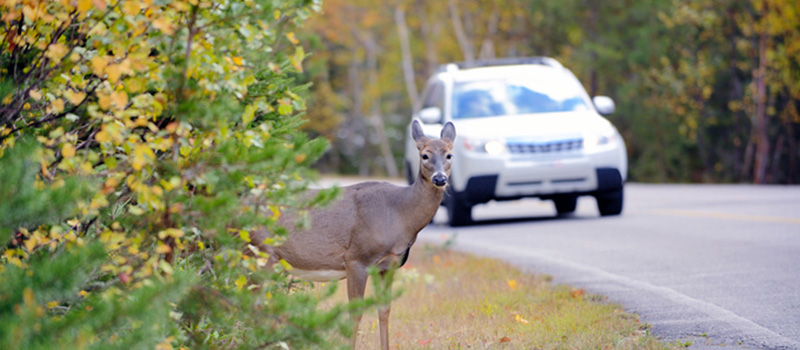I Hit a Deer. What Should I Do?
I Hit a Deer. What Should I Do?

I Hit a Deer. What Should I Do?
More than 1 million deer-related incidents occur each year, according to PEW. These incidents represent around 20% of all collisions and lead to more than $8 billion in property damage.
Deer are likely to be active in crossing roadways between October and November while they are in mating season. During this time, it’s important to watch the roadside for movement and drive cautiously, especially at dawn and dusk when they are most active. Slow down if you see movement or spot a deer because they are often in groups
While it’s important to drive carefully, accidents do occur. What should you do if you hit a deer? Keep reading to find out.
What To Do if You Hit a Deer
The risk of hitting a deer is higher in the late fall and early winter. Many collision insurance claims in the U.S. include deer-related accidents.
1. Get to a Safe Place
Turn on your hazard lights to alert other drivers if you’ve had a problem. Then, try to pull your car to a safe place along the side of the road or even into a nearby driveway. It’s important to get out of the way of other oncoming motorists to avoid additional collisions.
2. Do Not Exit Your Car
If your car is in a safe place along the side of the road, then the safest place for you is in the car. Deer can be unpredictable and dangerous when wounded, so you need to stay away from it. Remain in your car unless your car seems to be leaking, smoking or is in a precarious place.
3. Call for Help
Call 911 to report the accident and request assistance if the deer is blocking the roadway, you were hurt in the collision or your car is damaged enough to need a tow truck. Authorities can also help you fill out an official report to use for your insurance claim.
4. Document the Damage
If any witnesses stop, you can ask for their information in case you need a second-hand account later. When the situation is safe, take pictures of the vehicle, the roadway, and your surroundings. You want to document the incident in case your insurance agent has questions later.
5. Report Damage to Your Agent
If your car damage is significant, you may want to make an insurance claim. The sooner you can report damage or injuries, the sooner your claim is likely to be processed. You can usually make a claim by calling your agent or contacting your agent through their website.
6. Get Things Checked Out
Don’t assume your car is safe to drive and you are okay after an accident involving a deer. You can sustain injuries - especially in the neck — that aren’t immediately obvious without an x-ray. You might also have hidden car damage that could pose a threat later, like loose parts, leaking fluid, broken lights and tire damage.
It’s understandable if you feel shaken up or upset after hitting a deer with your car. Taking the time to slow down and process the event is a good idea before getting back on the road.
Content on this page is designed for general information and/or entertainment purposes. It is not intended to provide legal or any other type of advice and is not meant to be a thorough discussion of every issue that a person should consider or may encounter. Unless expressly referenced, we are not affiliated with any company or app that may be referenced herein and we do not endorse them. We are not responsible or liable for the user's reliance on this content or for the availability of links to other websites or resources, or for advertising, products, services or other materials on or available through these websites or resources. Any reference to third party rates or products is for identification only and is subject to change without notice.
